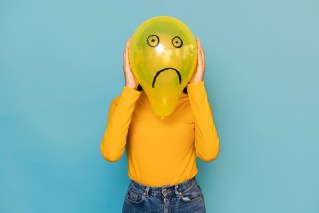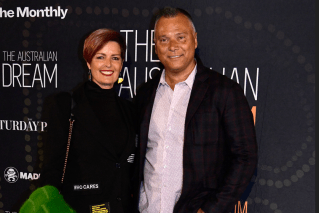Are babies born good or evil?


Extensive research has revealed whether or not "goodness" is innate. Photo: Getty
As much as a wailing, red-faced baby can seem monstrous, even wilful in its refusal to cooperate – “The little devil!” – what you’re wrestling with on the change table may be humanity at its most decent and generous.
Experiments with babies and toddlers in recent years suggests that – contrary to Biblical teachings which suggest human beings come into the world morally bankrupt – we are born with a tendency to be generous and kind. Our moral compass, deep down, points to the good path.
In a study by psychologist and cognitive scientist Paul Bloom, at the Infant Cognition Center at Yale University, one-year-olds were individually treated to a puppet show.
One of the puppets was sharing a ball with two others, one of which was cooperative, and handed it back; the other was naughty and kept stealing and running off with the ball.
At the end of the show, the puppets were taken from the stage, set before the baby, with each puppet given a small pile of treats. The baby was asked to punish one of the puppets by taking away a treat. The naughty puppet was all but consistently punished.
Of course, by age one, babies have already been exposed to the somewhat cloying oohs and ahs of approval after sharing a biscuit or a toy with a fellow drooler. That one-year-olds are to an extent socialised – and have been made aware of punishment – compromises Professor Bloom’s argument that the baby’s behaviour is naturally occurring rather than learnt.

Are demon babies a real possibility? Photo: Getty
However, in another study, Bloom found that infants (three months old) would reach out their arms toward a “helper” rather than a “hinderer”, which he again interprets as evidence of an inborn moral reflex.
Or, as he put it in his book, Just Babies: The Origins of Good and Evil, babies are “drawn to the nice guy and repelled by the mean guy”.
Bloom published his research about two years ago – and it confirmed what other behavioural psychologists had found in experiments with adults. But the doubters persisted, calling for hard science.
Since then, research into the neuroscience of morality – using a combination of social experiments, brain scanning and manipulation –has begun to confirm what the psychologists have been suggesting, that we are essentially good eggs when hatched into the world.
The bottom line is, man’s first instinct when confronted with a moral dilemma is to behave generously or cooperatively.
Can you cure badness?
In March this year, two UCLA neuroscientists published two studies that not only support the theory of innate altruism, they open a pathway to developing brain therapies for selfish people. The idea of curing people of their badness and lack of generosity is an ethical minefield but the science itself is illuminating.

All of us are good eggs when we hatch. Photo: Getty
In their first study, published in Human Brain Mapping, the UCLA scientists – Dr Leonardo Christov-Moore and Marco Iacoboni –exposed 20 adult subjects to a video of a hand being poked with a pin.
The subjects were asked to imitate photographs of faces that were either happy, sad, angry or excited. As the subjects grimaced and grinned, their brains were scanned with functional magnetic resonance imaging.
During the scanning, the researchers analysed several areas of the brain associated with experiencing pain and emotion and imitating others. They also looked for activity in the prefrontal cortex, which is responsible for regulating behaviour and controlling impulses.
In a separate activity, the same 20 subjects played what’s known as the dictator game, a popular experiment used by economists to study decision-making. The subjects played the game 24 times, and each time they were given $10 to either keep for themselves or share with a stranger.
After each subject completed the game, researchers compared their payouts with brain scans. Subjects with the most activity in the prefrontal cortex – where rational decisions are made – were the least generous.
However, the subjects with the strongest responses in the areas of the brain associated with perceiving pain and emotion and imitating others, were the most generous.
“The more we tend to vicariously experience the states of others, the more we appear to be inclined to treat them as we would ourselves,” Christov-Moore said, in a university prepared statement.
Can we force generosity?
In another study, published in Social Neuroscience, the researchers asked a big question: does activity in the prefrontal cortex block the altruistic impulse?

Suppressing activity in the prefrontal cortex can free up empathy centres, making people more generous. Photo: Getty
In the experiment, subjects were subjected to 40 seconds of Transcranial Magnetic Stimulation, temporarily reducing activity in targeted regions of the brain. The subjects whose prefrontal cortex was targeted with the magnet demonstrated 50 per cent more generosity than members of a control group.
“Knocking out these areas appears to free your ability to feel for others,” Christov-Moore said.
The researchers also found that who people chose to give their money to changed depending on which part of the prefrontal cortex was dampened.
“Normally, participants would have been expected to give according to need, but with that area of the brain dampened, they temporarily lost the ability for social judgments to affect their behavior,” Christov-Moore said.
Can we develop a pill to induce goodness?

Scientists are interested in whether a pill could increase empathy. Photo: Getty
The findings of both studies suggest potential avenues for increasing empathy, which is especially critical in treating people who have experienced desensitising situations like prison or war.
“The study is important proof of principle that with a noninvasive procedure you can make people behave in a more prosocial way,” Iacoboni said.
Last October, a team of American and British scientists found that a burst of Transcranial Magnetic Stimulation to posterior medial frontal cortex (a part of the brain that deals with threats) can temporarily change people’s feelings on a variety of subjects, including their belief in God, their attitude to immigration and other beliefs and prejudices.
This had led to talk about developing a “goodness pill’’.
The dark side of medication
Sometimes, however, pills bring on bad behaviour by opening up a new moral pathway.

“Somehow I felt like I was in a cloud of entitlement and protection.” Photo: Getty
A friend of this writer is a respected researcher who tells this story: “So basically when I started taking anti-depressants in 2005 in my last trimester of pregnancy, it really only took about two weeks for me to feel like a normal person again. But somehow the part of my brain associated with conscience or guilt seemed to go missing.
“I started shop-lifting in clothing stores, book stores and sometimes the supermarket, if I thought the price for something was excessive. It didn’t feel like a compulsion, it just felt like something I was entitled to do.
“Also by 2008 I started having an affair which also felt like something I was entitled to do, but for which I didn’t feel an ounce of guilt.
“I’ve seen some of the research on drugs and moral behaviour and I actually find it fascinating… these were actions that if caught, could have had series ramifications for my life and yet somehow I felt like I was in a cloud of entitlement and protection.’’








